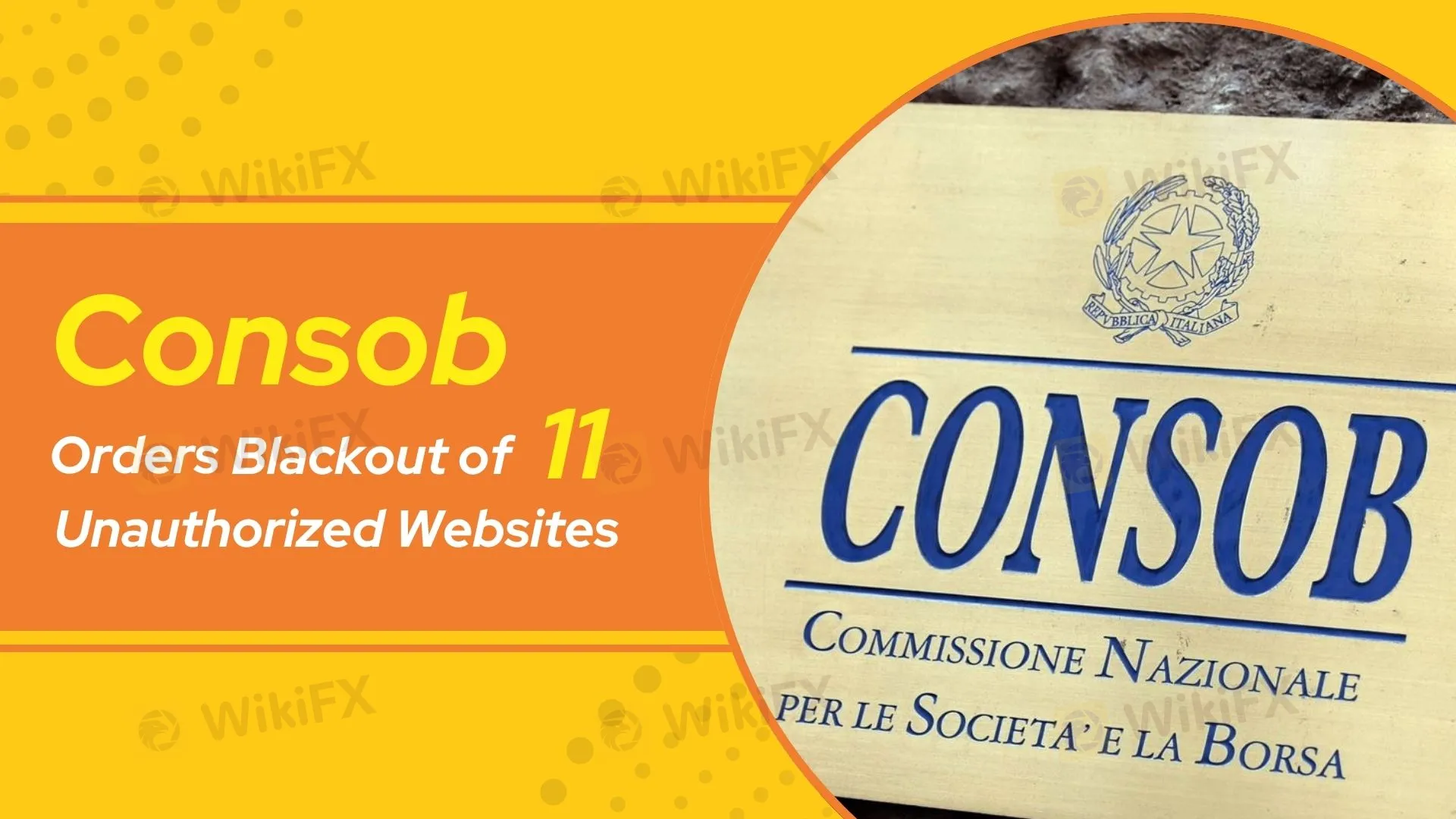简体中文
繁體中文
English
Pусский
日本語
ภาษาไทย
Tiếng Việt
Bahasa Indonesia
Español
हिन्दी
Filippiiniläinen
Français
Deutsch
Português
Türkçe
한국어
العربية
Consob Orders Blackout of 11 Unauthorized Websites
Abstract:11 new websites have been blocked by Consob for providing unlicensed financial or crypto services. WikiFX reminds investors to avoid unlicensed platforms and do proper background checks.

Italys financial markets regulator Consob has announced the latest round of enforcement measures aimed at protecting retail investors from unauthorized financial activity. On 22 May 2025, the authority ordered the blackout of 11 websites found to be offering financial or crypto-related services to Italian users without proper authorization.
The move includes seven websites involved in abusive financial intermediation, and four sites providing crypto services illegally. These actions are part of Consobs broader effort to limit public access to high-risk, unregulated platforms.
Legal Basis for Action
The blackout orders were issued under powers granted by the Growth Decree (converted into law no. 58 of 28 June 2019), which allows Consob to restrict online access to fraudulent or unauthorized financial intermediaries. For crypto-related services, the regulator also acted under new legal authority stemming from the MiCAR framework (EU Regulation 2023/1114) and Italys Legislative Decree No. 129 of 5 September 2024.
These combined regulatory tools enable Italian authorities to act decisively against online platforms operating without registration or transparency, especially when targeting domestic savers.
Websites Blocked by Consob
The following domains have been flagged and will be subject to blackouts by Italian Internet service providers:
- Lemintero – https://lemintero.co
- Geneve Capital Invest – https://genevcapinvest.com, https://webtrader.gencapwebtrade.com
- VT Markets Limited – www.vtmarkets.com, www.vtmarkets.net, plus subpages
- HotMarkets – https://hotmarketscfd.com
- Fusion4Markets – https://fusion4markets.cc, https://client.fusion4markets.cc
- Trustfxpro – www.trustfxpro.com
- Bvoxed – https://bvoxed.com
- BeratCoin – https://btc6688.com
- Interersos / Interesosf – https://interersosf.org, https://interersos.org
With this latest round of action, the total number of websites blacked out by Consob since July 2019 has now reached 1,328.
Investor Reminder: Always Verify Before You Trade
This latest enforcement action highlights the ongoing risks of engaging with unlicensed platforms—especially those operating online with little transparency. Investors are strongly encouraged to verify a brokers regulatory status, license details, and operational background before depositing any funds.
To help with this, users can turn to WikiFX, a global broker verification platform, to check for regulatory licenses, user complaints, and risk warnings. If a broker is not listed or lacks proper authorization, it may be best to stay away.
Always do your due diligence—if something seems too good to be true, it probably is.
Disclaimer:
The views in this article only represent the author's personal views, and do not constitute investment advice on this platform. This platform does not guarantee the accuracy, completeness and timeliness of the information in the article, and will not be liable for any loss caused by the use of or reliance on the information in the article.
Read more

The Scam Looked Real Until RM147,350 Disappeared
A financial analyst from Kuala Terengganu has lost RM147,350 to a sophisticated investment scam. The fraud was run by a syndicate that posed as a legitimate stock trading platform. The victim believed he was making a smart financial move. Instead, he lost his savings, borrowed funds, and company money to a non-existent scheme.

Red Flags Uncovered: IFC Markets Accused of Blocking Withdrawals
Recent complaints logged by users of WikiFX, a global broker regulatory query platform, have brought IFC Markets into the spotlight for all the wrong reasons. Multiple traders have reported serious difficulties withdrawing their funds, raising red flags about the broker’s trustworthiness and operational integrity.

Exnova Broker 2025: Shocking Scam Cases and User Horror Stories
Exnova Broker 2025: Disturbing scam cases revealed! Frozen accounts, $10,000 losses, and ignored withdrawals plague users. Unregulated with a 1.39 WikiFX score—steer clear!

Cloned Layouts, Fake Reviews: A Closer Look at Two Scam Network Cases
Identical websites, different names—same scam. See how fraudsters are cloning trading platforms and fabricating 5-star reviews to lure investors.
WikiFX Broker
Latest News
Is Saxo Broker the Right Choice for Serious Traders in 2025?
Cloned Layouts, Fake Reviews: A Closer Look at Two Scam Network Cases
They Let Him Win First, Then Scammed RM5.3 Million
ATFX Partners with Swiset to Launch Trading Tournaments Globally
Forex Fiesta: Where Trading Meets Fun! Learn, Fun & Win
FBS Earns a High 8.78 Rating in 2025: What Traders Need to Know
Unauthorized Online Platforms Exposed by BaFin in Latest Report
How Does CFI Academy Empower Traders of All Levels?
Close Up with WikiFX: TMGM's Presence in Thailand
Crypto Never Sleeps with Hantec Markets' 24/7 Trading
Currency Calculator


